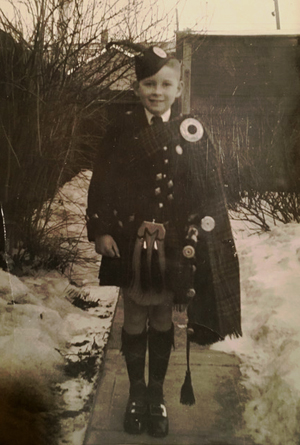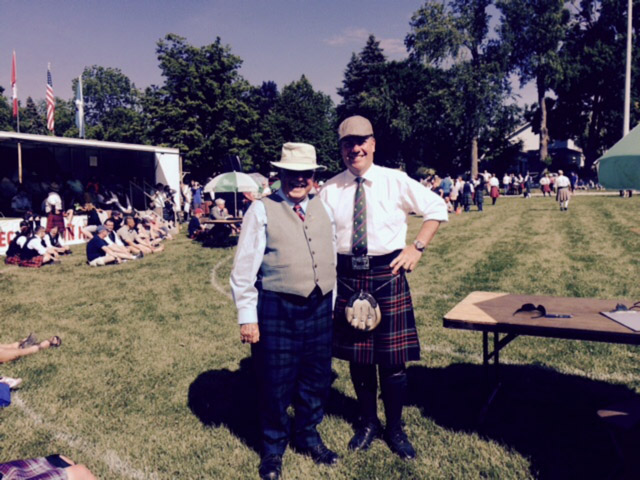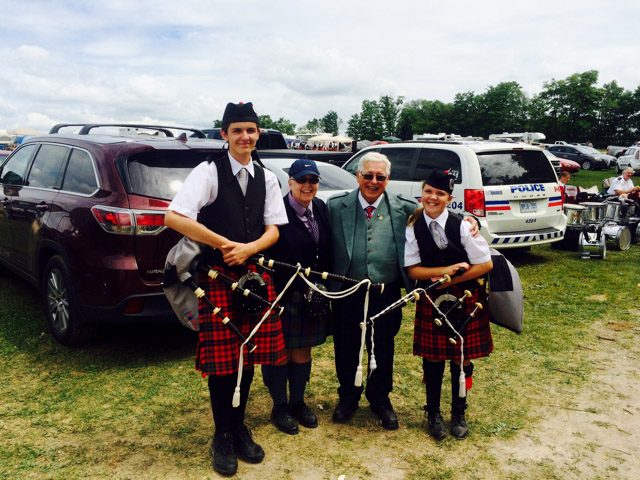Reay Sutherland Mackay – a tribute
By Michael Grey

Reay Sutherland Mackay was a great man. A family man first and a music man a close second, Reay was one of those rare people imbued with an aura of authentic sincerity. The follow-up questions he’d always ask when we’d meet, that after, “How’re you doing?” were, “How’s your mum?” “How’s the family?” It’s funny when reflecting on a person’s life – and the impression they left with you – that it’s the little things that stick. Reay gave much of himself and his gifts to the world but among it all it’s his thoughtful and appealing curiosity that I will remember right alongside his music.
He was interested in people, in things past, in things present. He was seriously great company. He loved a dram. He loved music as much as anything. As a teenager in his band, the Pipes & Drums of the 48th Highlanders of Canada, I remember waiting many – oh, so many – times after practice, to the small hours of the morning, for Reay, George Walker, Jimmy Cooperwhite, Stan Robertson, Darby McCarroll, Sandy Dewer – and others – to wrap it up so I could mooch my ride home to Rexdale. There was Reay, Pipe-Major of the band, and at the centre of the conversation, debating with the others topics like the merits of Muirhead’s march phrasing (“superior,” thought Reay) or how best to shave a McAllister reed. All this in the backdrop of a Bobby MacLeod or John Ellis record blaring away, with drams “nursed” in that old Moss Park Armouries basement pipe band bar. It’s restraint beyond doubt to say his passing is a great loss: to his family, to his friends but also, to piping. In his piping, in his deep experience, Reay was one of our most important tradition bearers. This cannot be underscored enough.
Reay was born in Toronto in 1939 to Colin and Mary (Spence) Mackay. Both his parents were Scottish immigrants, both from the far northern islands of Orkney: his father from Hoy and his mother hailing from Brodgar, Orkney. I knew both his parents a little. I will never forget his mum, Mary. One summer I and some piper pals from the 48th, painted the Mackay summer cottage on Lake Couchiching north of Toronto – a painting-for-piping-lessons deal. Mary was there and in full control. She could never get over the fact I wouldn’t eat an egg. I think it was her secret mission to get one in me. She was a happy, droll, ruddy-faced, compact, dynamo of woman. Reay took after her in many ways.
Reay was a school teacher by profession but, like so many, a piper by avocation. He was a childhood prodigy. He was taught first by his father and later by Murdo MacLeod of Benbecula, a pupil of John MacDougall Gillies. On John Wilson’s arrival to Ontario in 1949, Reay would be among the Edinburgh maestro’s first Canadian students. Reay stormed the vibrant Ontario piping scene and by 1953 – at the age of 13 – was ready for his first professional solo piping contest: the Toronto Indoor Games. Against the greats of the day, including his teacher the legendary John Wilson and Detroit’s George Duncan he won the march (“Miss Elspeth Campbell”) and the strathspey and reel events (“Shepherd’s Crook” / “The Little Cascade”). In fact, unbelievably, there are recordings in the hands of the family of these historic performances. At 13, Reay the solo piper was off-and-running.
In his solo piping Reay experienced unprecedented success. He won all the prizes of his time (as a remarkably young person), including the North American Championship, Maxville, many times over. In part, perhaps, to having great success so early, Reay stepped away from solo piping in his late twenties. His young family called on more attention, his band, the 48th Highlanders, was one of the busiest in the city of Toronto, and Reay, the ever-inquisitive musician, found himself drawn to the box: by the 1970s, Reay had become an accordion aficionado – and, as one might expect, one that could really do the business. He featured regularly in Bobby Brown’s Dance Band, the foremost combo of the time, and was on-call for dance band work everywhere. In the Toronto of thirty or forty years ago – this amounted to a lot of good gigs.

With the backdrop of this intense musical and family life at play Reay was still an active member of the Canadian Armed Forces. He was “on strength” in the Canadian militia (the UK Army Reserve) and rose to the rank of Chief Warrant Officer. His father, Colin, and Uncle Douglas Mackay, were both members of the 48th pipe band and so he surely honoured them in his achievement of becoming Pipe-major (1975-1985). Reay was to lead the band to great success, including great results around the Ontario grade one competitive circuit – this despite the chronic military band challenge: uncompetitive drumming.
Soon after the 48th Reay found opportunities in the civilian world of pipe bands. Not so long after his time in the 48th Reay would take the helm of the Toronto Police Pipe Band’s competitive band and lead the team to a victory in the 1986 grade two Cowal Championship.
My favourite hornpipe, and a tune among all my favourites, is Reay’s, “Colin Mackay,” a tune he wrote when he was just 13. Reay was a superb composer of music. I recently had the privilege to proof material from two of Reay’s planned music books – books I know will be published before too long. The exercise confirmed what I know: the man knew how to build really fine tunes.
But back to Reay the tradition-bearer: Reay lived a life that was witness to the better part of the 20th century’s great piping events and, as importantly, the culture that supported these events. It was only a few weeks ago that I talked to Reay about such things. He told me a great story, here it is, verbatim:

“I remember my two uncles – Uncle Tom and Uncle Jock [Mackay] – they lived on Whitmore Avenue in Toronto and right next to my Uncle Tommy was Murdo MacLeod and right next to him was Allan MacLean – you see Murdo MacLeod and Allan MacLean were both from Lewis . . . at one time, Michael, there were four different Murdo MacLeods in Toronto. The fellow that lived next to my Uncle was Big Murdo, and the other Murdo who lived in the east end was Little Black Murdo, and then the Murdo from Benbecula was Murdo a Phiobair – and what the hell was the other Murdo – yes – Red Murdo. And oh they all love pipes.”
Thank you, Reay and God bless you. You surely had a kindred spirit with the four Murdos.
Our sincerest condolences to Reay’s wife, Joan and family, Sheila (Michael), Glenna (Alasdair) and grand-children, Katryna, Colin and Kayleigh.
Dileas gu brath.
Michael Grey was a pupil of Reay Mackay for many years when they each were in the Pipes & Drums of the 48th Highlanders of Canada.

Very poignant article about Reay. When I returned after 2 years on my mothers croft near Stornoway in September 1953, living on Farnham Ave., I had to go to Oakwood CI. In my grade 9 class was Reay MacKay. He said he played the pipes and was a member of the 48th P&D. I said I would like to learn the pipes. We would go down to his parents house on Dovercourt Rd. at lunch time and I learned the chanter. Then on to going down to University Ave.
Armouries for chanter practice on Tuesday night band practices, and within a year on to the pipes and joining the 48th P&D and spent the next 30 years with the band. This all came about because I was most fortunate to have met Reay in grade 9 at Oakwood CI. He will be missed by all the piping and pipe band world, but NEVER FORGOTEN!
Peter K. MacLeod, 48th Pipes and Drums Association
Well said, Michael.
Reay was a fine man, in every sense of the word, and will be missed.
My dad, Donald, and I offer our sincerest condolences to Joan, Glenna, Sheila and the entire MacKay family.
We also wish to say “thank you, Reay” for your friendship and many kindnesses over the years.
Dileas gu brath,
Duncan Pringle
A beautiful tribute to a beautiful man, Michael. The warmth, humour, talent, generosity, and caring which helped define Reay are all captured so perfectly by Michael. Thoughts and prayers for Joan, Glenna, Sheila, and their families. He was so proud of all of you.
Well said Michael. Thanks!
That is a wonderful tribute Michael. It really captured the essence of the man I knew. I had the privilege of playing under Reay as lead drummer of the Toronto Police Pipe Band in the mid eighties. We had some great successes in those years and much of that was down to Reay’s understanding of ensemble and the importance of creating a moving musical performance. I learned a great deal from Reay during those years and I am forever grateful.
One of my favourite memories of Reay is when we judged the Grade 1 contest in Maxville together. The heavens opened, the rains came and we were forced to complete our sheets in a small kitchen huddled together over a small table in very soggy kilts and jackets. We laughed about that for many years after. Reay was a gentleman and a wonderful teacher and I consider myself very lucky to have had the privilege to know him. He will be missed.
Greg Dinsdale
Michael,
Outstanding tribute to an outstanding individual.
Reay was my first pipe major in the 48th Highlanders back when my older brothers were in the pipes and drums. I was 10 years old in 1981 when I started attending rehearsals at Moss Park and couldn’t wait to join. Because my oldest brother Brad joined the 48th in 1975, I recall going down to the armouries with my mom or dad to drop-off he and my middle brother, Cameron, as they received weekly Saturday lessons from John Wilson who taught there for the better part of 3 decades (this partially explains why the 48th pipe corps was as formidable as it was).
At the end of the 1981 competition season, the 48th stepped away from the Grade 1 circuit (I recall their last season under Reay’s leadership when the band gave some great performances). In the winter of 1983, Reay and his pipe sergeant, Sandy Dewar, decided to make the attempt to get the band back into playing form for the 1984 season and so Sunday contest band rehearsals (re) commenced (those pipers and drummers in the 48th will remember how busy the schedule was – two regular parade-band practises on Tuesday and Friday evenings followed by 3 hours for the contest band on a Sunday). With all of the big band engagements around Toronto and southern-Ontario, the regimental commitments and the road-trips, I look back now and think we must have been insane to maintain such a crazy tempo!
Anyway, I was 12 when the contest band tried to get out of the blocks. Reay and Sandy started to teach the younger pipers in the band for an hour preceding contest band rehearsals at 10:00 a.m. Reay taught me at this time and I well remember how he imparted the band’s MSR to me – NO MUSIC and all by ear: Brigadier Cheape, Mary J. MacKay (his own composition) and Mrs MacPherson of Inveran. It was pure brilliance on Reay’s part and I still vividly recall those lessons I got from the master.
Reay was one of those gifted individuals who had it all – superior musicianship (not only did he have an innate sense for music, he also composed wind ensemble scores for tattoos and other performances with our military band; his training on the accordion and knowledge of the piano keyboard gave him the avenue to draft some very melodic accompaniments for the pipes); inspiring leader (he would always address the 48th beginning with the term “Gentlemen…” and he would go on to debrief the group on our performance; there was never any shouting with Reay); gifted teacher (he had the unique ability to translate his musical ideas into understandable English and influence us to perform exactly as he wanted); and lastly, an outstanding piper.
Hearing Reay pipe on a Friday evening following a band practise was a treat. After our dismissal from rehearsal at 22:00, we retired to the band mess and occasionally, the pipes would get passed around (just as the drinks were flowing). We juniors would go through our competition repertory and then the old stalwarts would get-up and give a few tunes. Occasionally, Reay would play and this was where we heard his immaculate technique – and his pipes – in full glory.
But his best performance, to my mind, took place following John Wilson’s death. In the winter of 1982, the Toronto Pipers Society (with Michael Grey in the lead) staged a tribute concert to Wilson by his three most outstanding pupils – Bob Worrall, Bill Livingstone and Reay (a massive snow-storm prevented Pipe Major Bill Gilmour from performing at the concert; Bill was the senior Pipe Major of the Canadian Armed Forces and stationed in Ottawa). Reay gave the best of the lot when he played four MSRs – four marches, four strathspeys, four reels. It was a perfectly executed marathon of music. The only other person I’ve heard pull off a flawless performance like that was Alasdair Gillies in 2002 (I heard Alasdair at the lunch time Piping Centre Concert series in Glasgow). Wow.
Reay was my PM from 1982-1985…his medleys were imaginative with 2 and 3 part harmonies in marches, slow airs and in passages of piobaireachd too.
Reay’s music, leadership, and personality left a lasting impression. As my Mum said to me on the phone a few days ago as we chatted about his passing: “He was such a kind gentleman. No one could ever say anything nasty about Reay MacKay.”
And as my brother Cameron recently related to me by email – “Reay’s drive was routed in passion and being the selfless man he was, his drive, I believe, was for the greater good.” Truer words could not be spoken.
My memories of Reay and the 48th Highlanders are fantastic. As far back as I can remember, I spent my boyhood steeped in a regimental music culture that promoted, developed and delivered artistic excellence. Those experiences explain my service in the Canadian Armed Forces today, and my continued appreciation, support and participation in military piping in all its forms.
Rest in peace Pipe Major Reay MacKay.
Dileas Gu Brath
Fraser Clark